Contents
- Why Remote Workers Need an AI Coach
- Millennials Are the Real AI Natives
- 5 Steps to Build Your No-BS AI Career Coach in ChatGPT
- The AI Coach That Builds You
What if the best career coach you’ll ever have... is a robot? Remote workers have always lacked one thing - real mentorship. But now, top 1% performers are training smarter - by building AI career coaches that act like mentors, strategists, and performance analysts all in one.
Can an AI coach make you a top 1% performer?
Yes - if you know how to build one.
Unless you’re in the trenches of daily AI upskilling, advanced agent building and automation – there’s a good chance you’ll try to use AI to grow your career – and it will blow up in your face.
Or worse, have zero effect.
That’s why this might be the most important article you read (and apply) this year.
Most people in tech don’t have the time, tools or structure to upskill at the pace that AI demands. But the tech talent gap continues to widen anyway!
The implications for your career over the next 2 years are at critical mass.
- Bain & Co says HALF of AI jobs could go unfilled by 2027
- India’s AI sector is projected to add 2.3M+ roles by 2027
- The UK will hit a 50% AI talent shortfall inside of 2 short years
Lots and lots of AI jobs. Fewer and fewer people to fill them – that’s the reality.
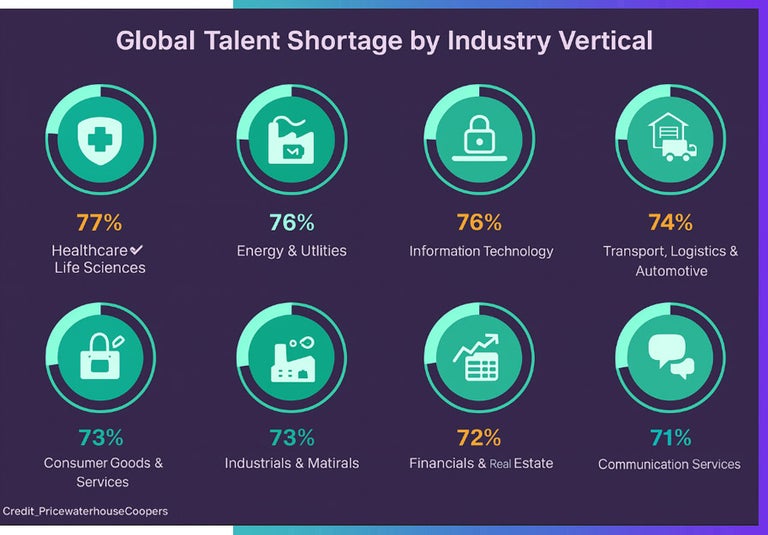
Globally speaking, AI is the single BIGGEST opportunity of your tech career. If this hasn’t sunk in yet, my hope is that building your own AI coach will jar you awake and help you keep up with the times.
Because when critical shortages hit tech, so do massive pay rises.
And unless you have a mentor or life coach to help you pay attention to these shifts, you’ll miss them.
AI offers us a fix for that too.
In this article, you'll create an AI coach that turns daily effort into elite results - and puts your career on a 10X trajectory.
Why Remote Workers Need an AI Coach
Talent with coaching has always produced greatness.
- Soccer coach Pep Guardiola pushed Messi, Haaland, and De Bruyne to execute inside brutally efficient systems, and they built dynasties.
- Phil Jackson mentored Jordan and Kobe to 11 NBA titles through inner discipline and relentless feedback.
- Gary Kirsten coached India’s cricket team to a World Cup win - not by micromanaging, but by unlocking consistency under pressure.
- Bill Belichick turned unglamorous players into championship material using fierce execution and clarity.
- And Dawn Staley transformed women’s basketball through structure, grit, and zero tolerance for mediocrity.
Every top 1% performer had SOMEONE who held them to a higher standard. Now, remote workers finally can too!
Too many high potential remote workers are stuck learning alone, hoping their effort gets noticed. They miss the invisible close proximity coaching that turns average into formidable.
That kind of support system used to be reserved for athletes and top execs. At least, it used to be before AI gave us the power to build our own career coaches.
Your AI-career coach is a personal, custom-built coach and advisor that will learn your goals, track your progress, give you unfiltered, invaluable feedback – and it will keep you sharp over time (like rocks shaped by a constantly shifting ocean.)
You can build yourself one in ChatGPT or Claude, using projects.
When I did my EMBA in 2020, the #1 thing we were taught was to find great mentors. Because with a strategist, skills trainer and accountability partner in your corner – you really do step into a new league of career performance.
Your AI coach will:
- Pinpoint your blind spots
- Help you master high-leverage skills faster
- Hold you accountable without judgment or delay
- Keep your career trajectory aligned with what the market actually needs
- Keep you up to date on the latest developments in your field
For remote workers who don’t have mentors to push you, managers to closely shadow your growth and no clear path to elite performance other than your own variable motivation – it really is one of those life-changing shifts you hear about.
I’ve always known you don’t need in-person visibility to become a top 1% performer.
Einstein didn’t workshop his most influential ideas over banal chats at the watercooler, teambuilding retreats or regular daily standups.
His correspondence with Michele Besso - exchanged entirely through letters - sparked the theories that reshaped modern physics. I’m talking special and general relativity, quantum mechanics and unified field theory. Their conversations were all they needed to change the world.
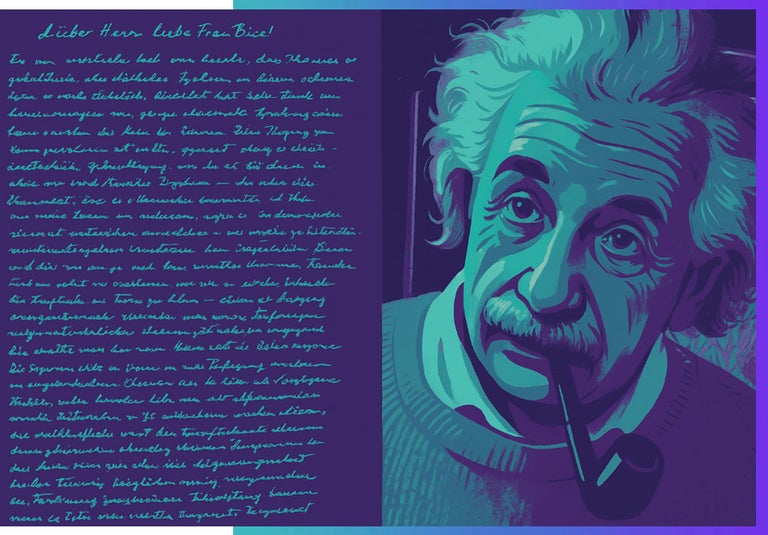
Structured thought, deep feedback, and intellectual challenge don’t demand physical presence. They require consistency and clarity.
That’s exactly what an AI coach can deliver - if you build it right.
Millennials Are the Real AI Natives
Before I show you how, here’s a hot take folks! When it comes to AI in the workplace, Millennials are the ones leading the charge.
Not Gen Z, not Gen X and not Boomers.
Full disclosure, I’m a Millennial. So, I didn’t grow up being spoon-fed AI filters through TikTok and Instagram. I was around when the closest thing to AI I could imagine was an army of terminators fighting against John Connor.
Like many Millennials, I saw AI grow legs, and arms – and start running. I chose to start using it when it was just another passing fad.
Many of us built trust with early (and insanely bad) tools, we tested them in the wild and figured out how to make them work under pressure.
We were the ones who piloted AI tools for their teams, guided adoption and learned how to turn experimentation into results.
That EARLY adoption is paying off.
- According to McKinsey 90% of Millennials aged 35-44 are confident in their GenAI abilities. The highest of any age group in the workforce.
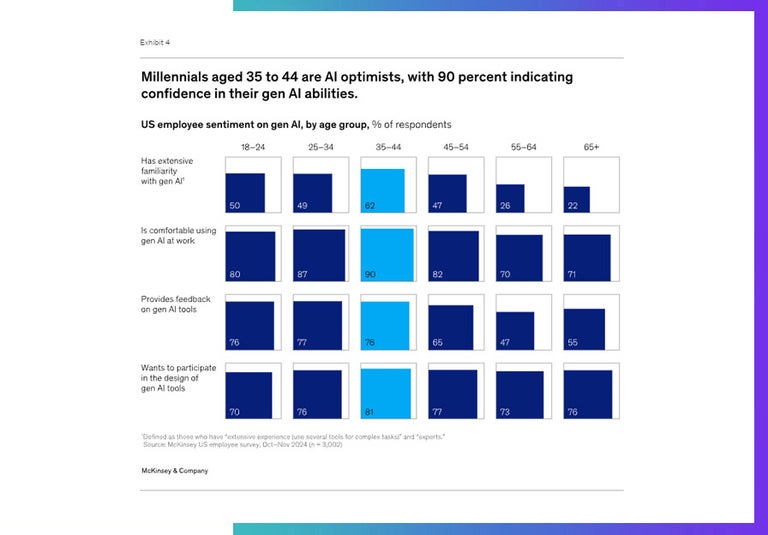
Millennials are the people with enough experience to apply AI in real-world systems, and enough adaptability (shoutout to constant global chaos) and urgency to do it fast.
But even the most AI-native Millennial professionals face one persistent blocker…time.
- 42% of US workers say they’d upskill into new roles, if only they had the time.
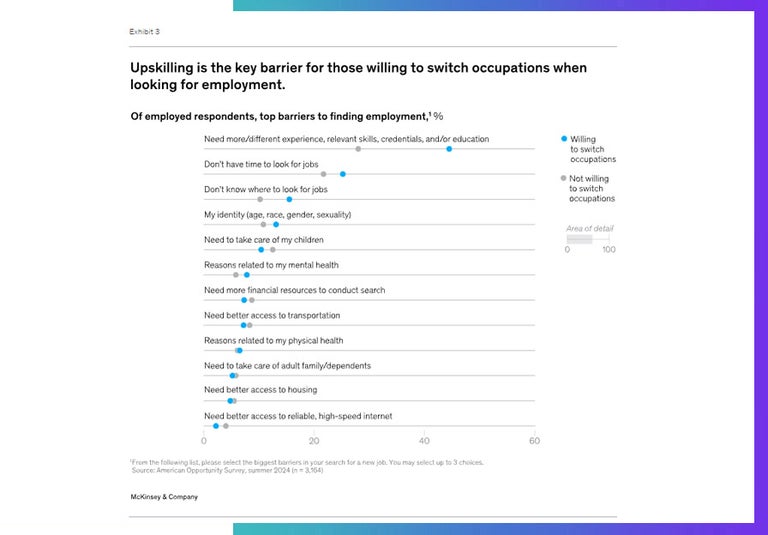
Time people. It’s what AI gifts us once we stop using it as a platform and start using it as an assistant (or in this case, a coach).
Millennials aren’t just early adopters anymore. We’re the super agents of AI in the workplace – IF we can figure out how to build the systems that will keep us that way.
Enter your own personal AI career coach!
5 Steps to Build Your No-BS AI Career Coach in ChatGPT
Projects in ChatGPT is a sneakily powerful performance system builder.
If you want an AI career coach that challenges you, adapts with you, and helps you outpace 99% of your peers - you’ll need more than clever prompts and questions.
You need structure.
Projects in ChatGPT help you build persistent, evolving workflows that go well beyond casual everyday queries.
Anyone can do it, and here’s how.
#1: Tell Your Coach What You’re Playing For
Create a document: Career_Mission_Statement
Put it: in the knowledge tab inside your Project
Goal clarity is the #1 predictor of high-performing individuals in remote teams.
The trouble with your AI coach is that it does a LOT of guessing and probabilistic interpretation of context. So, it defaults to fluff…a lot. If you’re not fully aware of this, it’s easy for the LLM to sound like it knows things.
You need to reduce over-explanation, repetitive sentences and filler nonsense. That way it won’t drift without career direction, and it’s less likely to create generic responses and provide you with ambling feedback.
The way to do this is by giving your coach specific, personalized instructions.
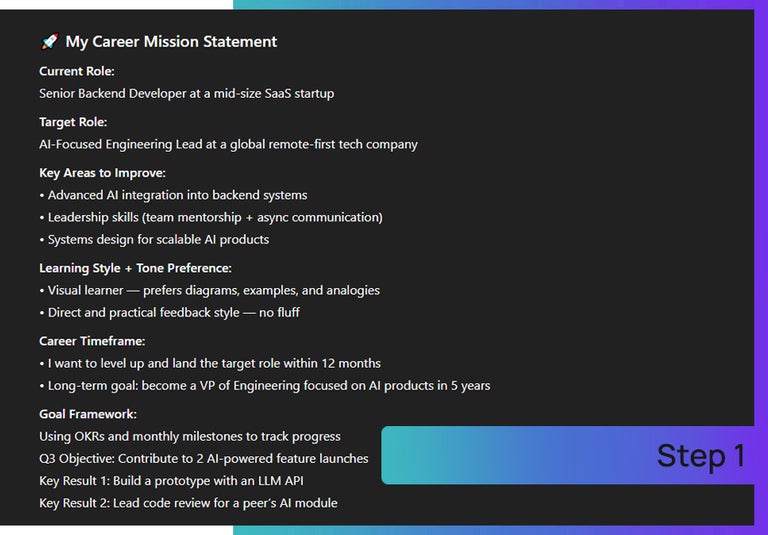
Start with a project setup document:
- Include your current role and your target role or title
- The key areas to improve (team leadership, AI upskilling, systems design)
- Add your learning style and tone preference
- Add in a career timeframe (help me get there in X months)
Tip! Add your preferred goal setting frameworks like KPIs, BHAGs, the OKR method or SMART goals.
Start by anchoring your AI coach to your purpose.
#2: Show it What You’re Working With
Create a document: Current_Skills_Assessment
Put it: in the knowledge tab inside your Project & reference it in prompts.
Gallup knows that feedback fuels performance – 80% of employees who get it are more engaged at work.
The reality is that most remote workers don’t get regular feedback. And without it, they have no idea how to grow. Your AI coach needs a data baseline.
Otherwise, it’ll coach you like you’re a beginner, or worse, an expert. This is where you give it the raw materials – data, statistics, documents and histories. This is the step that turns a bot from a generic content parrot into a personalized performance mirror.
You’re eliminating vague and irrelevant advice, killing the horrifying (and extremely destructive) echo chamber effect where the LLM schmoozes you into early career death, and you help it spot invisible weaknesses in your skill stacks.
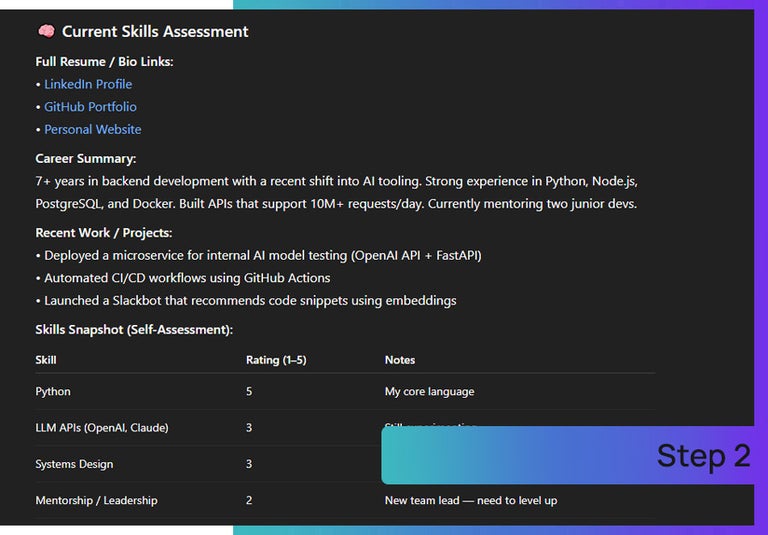
Create a second document with:
- Your full resume, LinkedIn bio, and portfolio
- Examples of recent work or project summaries
- Links to works you’ve authored online or work samples
- Skill test scores and achievements
- Feedback from past performance reviews
- Self-assessment on core competencies (rate your strengths and known gaps)
Tip! Adding your CCAT scores helps the AI coach understand what you’re capable of. Continually add to this document to keep it fresh as time wears on.
Personalize your AI coach so that it knows you.
#3: Get Weekly Coaching That Slaps
Create a document: Weekly_Coaching_Protocol
Put it: in the knowledge tab inside your Project & reference it in prompts.
Deloitte says workers who regularly self-review using feedback mechanisms are 31% more likely to get promoted!
This is where most people tragically fall apart. There’s no rhythm, no reflection, and no review process when it’s just you and your workday.
They just use AI now and then for fun and giggles, or when work makes it impossible to avoid. But if you want that sweet elite performance, you need to bake in consistency.
Your coach needs to hold you to a weekly cadence - just like a real mentor would.
No progress = no payoff. This step creates a delightful feedback loop where your AI coach challenges your thinking, tracks your progress and holds you to your plan.
This guarantees that your growth doesn’t stall, that you’re ALWAYS accountable and that you can learn from reflection in a safe, non-judgmental space.
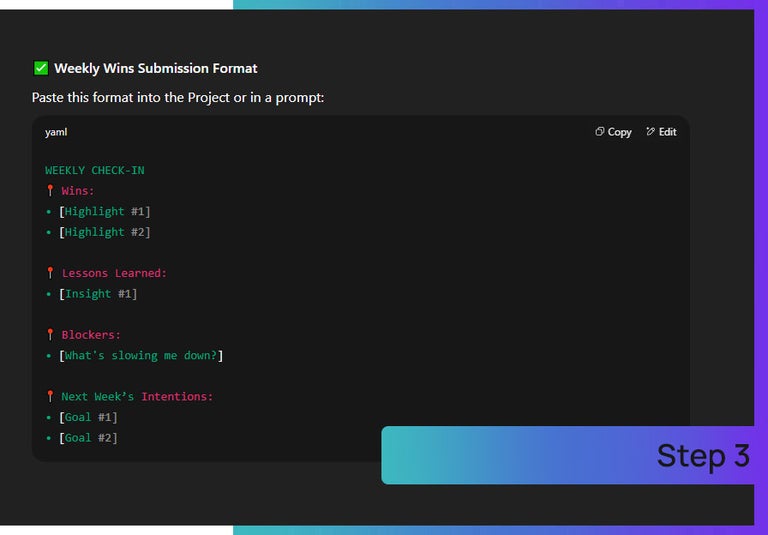
Include in the third document:
- Weekly reflection questions (3-5 prompts)
“What did I learn?”
“Where did I underperform?”
“How would a top 1% engineer have handled this?”
- A format for submitting weekly tasks or wins
- Examples of what great feedback looks like
- Instructions on how to evaluate your progress
- A log of tracked habits or micro-goals
Tip! Prompt your coach: “Use X protocol to guide our weekly coaching sessions. I’ll paste my reflections or task summaries each week. Review my inputs using this format, then push me with actionable, honest feedback”.
Train it with the tools you’d expect from a real coach - frameworks, prompts, and examples.
#4: Keep Your Coach Informed
Create a document: Career_Radar_Inputs
Put it: Upload fresh versions monthly into Knowledge, or paste sources into Memory if you’re using GPT-4o with live links.
Remember the McKinsey report that outlines how key it is to stay current on AI?
Most workers get blindsided by industry shifts, and we all know keeping up with AI is a game of catch up. A real coach would keep you updated on things. Your AI can too - if you plug it into the right trends.
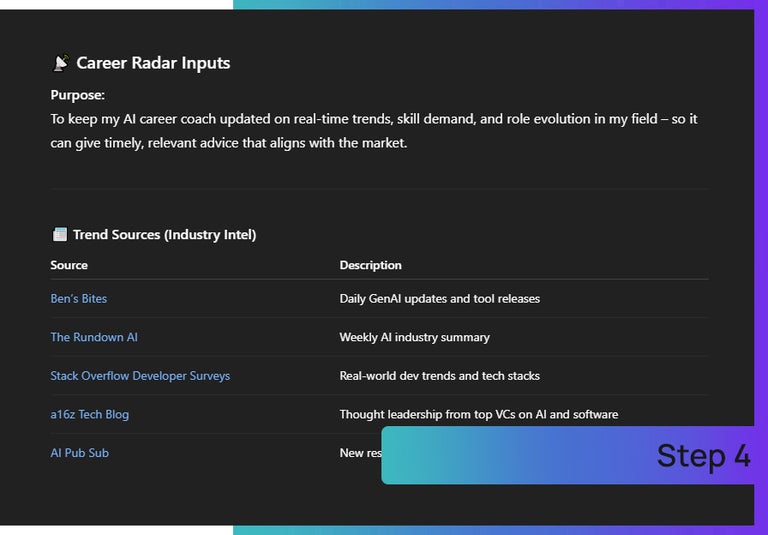
- Top newsletters, blogs & other sources from your industry (for trend scanning)
- 5-10 job listings from roles you aspire to
- Notes or summaries from recent tech conferences or research papers
- List what you’d like your coach to track and flag in reports
- Emerging tools in my tech stack
- AI skills relevant to X and Y roles
- Remote companies hiring in my niche
- Certifications and courses worth taking
- Skills that are losing value and why
Tip! Prompt your coach: “Based on Career_Radar_Inputs.txt, what should I focus on this month to stay competitive?” “What’s trending in backend + AI jobs right now, based on the sources I gave you?” and “Am I missing any critical skill based on my target roles?”
Ready your AI coach to give you accurate weekly trend updates and reports in your niche.
#5: Create The Long-Term Playbook
Create a document: Long_Term_Career_Playbook
Put it: Upload to Knowledge, and set monthly reminders to update it.
The World Economic Forum says that long-term skills planning creates a 34% boost in success likelihood when switching roles.
I like to call this last doc ‘build the system that builds me.’ You’re not here to be pretty good or to eek by on average. You’re here to become the absolute best, top of your field, highest you can go – master of your chosen job.
This is your long-term training arc - the difference between chasing hacks and compounding value over time. Use this document to keep your coach aligned with your 1-year, 2-year and 5-year plans.
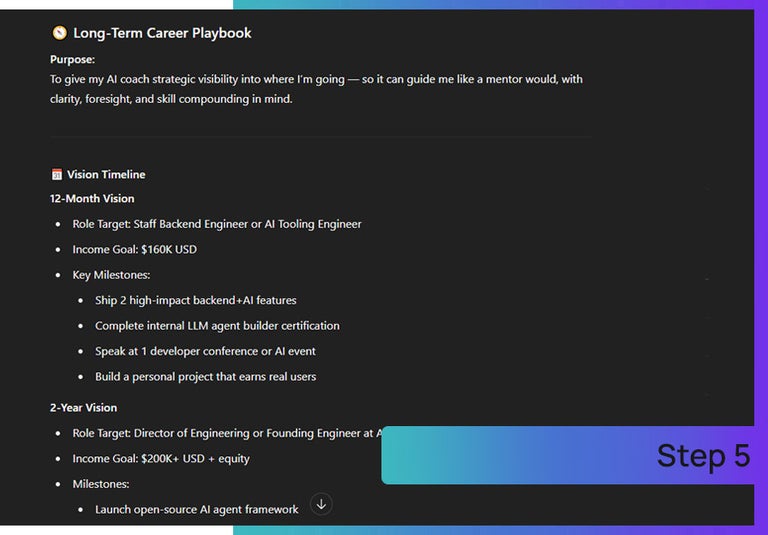
- A 12-month vision plan - goals, role changes, income targets
- A 2 year vision plan - goals, role changes, income targets
- A 5 year vision plan - goals, role changes, income targets
- Key skill pillars (following a t-shaped skill stack pattern)
- Role models to emulate in your niche
Tip! Prompt your coach: “Coach me as if you’re my future self 2 years from now, what should I do next?”
Turn your AI coach into a long-term partner that guides your career - not just your next task.
The AI Coach That Builds You
When you work remotely you don’t need an exclusive title, a Silicon Valley mentor, or a degree from MIT to become a top 1% performer.
You only need a coach who will push you - relentlessly, intelligently, and consistently.
That’s what made Messi world-class under Guardiola and sharpened Jordan’s mindset under Phil Jackson. It’s what turned ordinary athletes into champions under Belichick, Kirsten, and Staley.
That LEVEL of elite coaching isn’t reserved for sports legends or rich corporates anymore.
You can build it. Right inside ChatGPT.
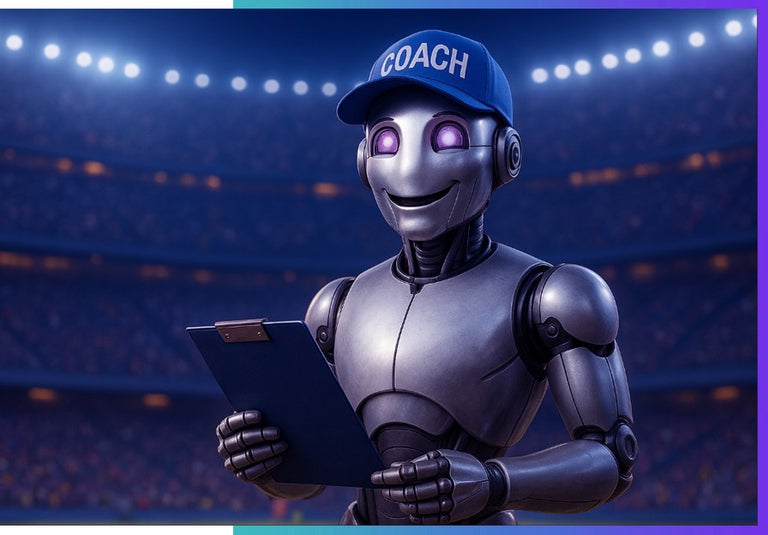
This training system will help you grow sharper every week, stay relevant every month, and lead the field in the years to come.
An AI coach is the single biggest competitive advantage in your career - if you build it right.
It will:
- Track your growth
- Hold you accountable
- Tune in to market shifts
- Push you harder than your comfort zone allows
- And guide you toward long-term mastery, not just short-term wins
Because AI exists for YOU – but first you have to choose to compete, choose to grow, and to be great even though it’s hard.
You have never needed in-person visibility to stand out. You need clarity and feedback - now, you’ve got a system that delivers both.
So go build your AI coach.
And let it build the most powerful version of you.








